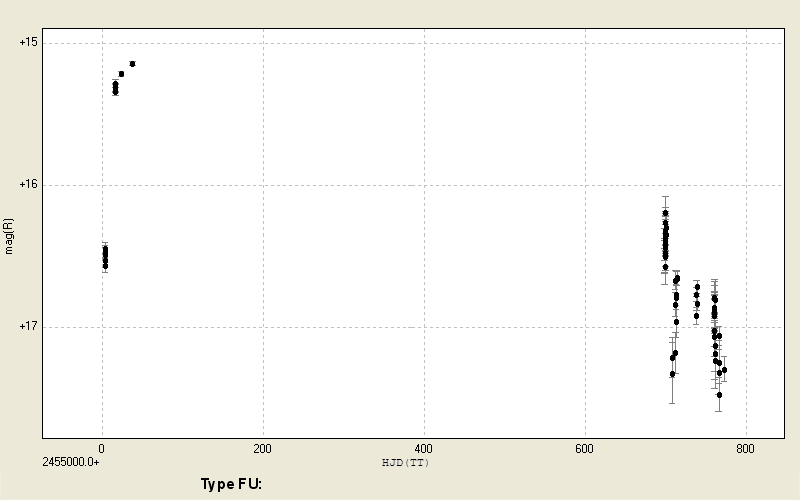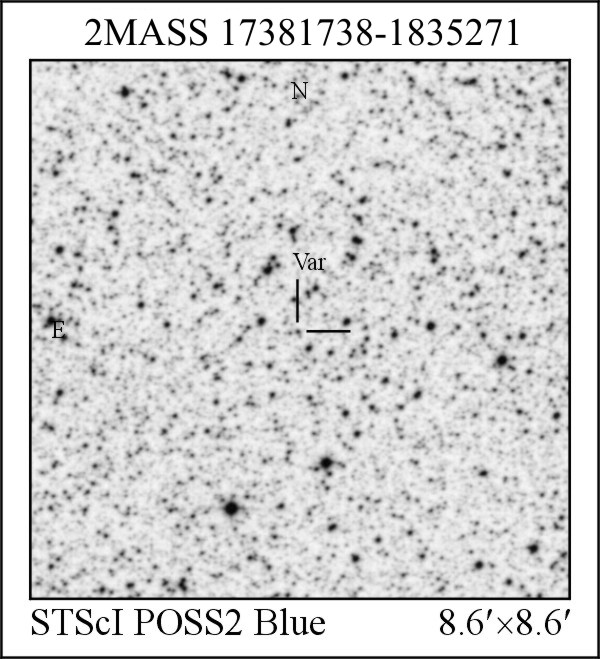"Peremennye Zvezdy",
Prilozhenie,
vol. 12, N 16 (2012)
Prilozhenie,
vol. 12, N 16 (2012)
A Possible New FU Ori-type Variable Star
V. Solovyov#1, A. Samokhvalov#2, B. Satovskiy#3
#1. Kazan Federal University, Russia;
#2. Surgut, Russia;
#3. Astrotel Observatory, Karachay-Cherkessia, Russia
#2. Surgut, Russia;
#3. Astrotel Observatory, Karachay-Cherkessia, Russia
Received: 12.11.2012; accepted: 22.11.2012
(E-mail for contact: solo.vya@gmail.com, sav@surgut.ru, bs25@mail.ru)
| ||||||||||||||||||||||
Remarks: |
| During observations of a field in Ophiuchus, we discovered a possible new FU Ori-type
variable star.
Our observations were carried out at the Astrotel-Caucasus observatory, located at
the Astronomical station of the Kazan Federal university, using the 300-mm
Ritchey-Chretien telescope, equipped with an unfiltered Apogee Alta U9000 CCD camera.
A total of 648 images with 5-minute exposures were obtained on JD 2454968–2455772.
For basic reductions for dark current, flat fields and bias we used IRAF routines.
For search and photometry of new variable stars, we applied VaST software by Sokolovsky
and
Lebedev (2005). The comparison star was USNO-A2.0 0675-20424709 = USNO-B1.0 0719-0588525
(α = 17h35m13s.23, δ = –18°03′
24″.0
(J2000, 2MASS)),
R1 = 12m.93, R2 = 13m.72
(USNO-B1.0). Unfiltered magnitudes were calibrated using the comparison star, assuming
Rcomp = 13m.325.
The coordinates of the variable star were drawn from the 2MASS catalogue
(Skrutskie et al. 2006).
2MASS 17381738-1835271, also known as the infrared source IRAS 17353-1833, has abnormal infrared colors: J–H = 1.444, H–K = 0.964 and J–K = 2.408 (2MASS). During the first observing season (2009 May 16 – 2009 July 24), the star experienced an optical burst with an amplitude exceeding 1m.5. In the second observing season (2010 March 23 – 2010 July 25), the star was fainter than 20m. Having combined all images obtained in the second season, we found nothing at the star's position. During the third observing season (2011 May 16 – 2011 July 29), the star exhibited irregular variability with an amplitude ~1m. Such photometric behavior does not exclude the classification of 2MASS 17381738-1835271 as an FU Ori variable. We would like to draw attention of the astronomical community to this interesting object and call for further observations of the star in order to clarify its nature. Acknowledgements: We would like to thank S.V. Antipin and N.N. Samus for helpful discussion. |
| References: |
| Skrutskie, M.F., Cutri, R.M., Stiening, R., et al., 2006, Astron. J., 131, 1163
Sokolovsky, K., Lebedev, A., 2005, in 12th Young Scientists' Conference on Astronomy and Space Physics, Kyiv, Ukraine, April 19-23, 2005, eds.: Simon, A.; Golovin, A., p.79 |
Light Curve
Finding Chart 
Data Source |